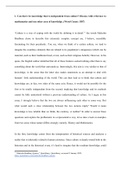1. Can there be knowledge that is independent from culture? Discuss with reference to
mathematics and one other area of knowledge. (Word Count: 1587)
“Culture is a way of coping with the world by defining it in detail:” 1 the words Malcolm
Bradbury chose to describe this extremely complex concept are, I believe, incredibly
fascinating for their peculiarity. You see, when we think of a certain culture, we tend to
imagine the countless elements that are related to its population’s uniqueness (which can be
material, such as their traditional food, or not, such as their religious beliefs). However, in his
quote, the English author identified that all of these features seeked nothing other than to say
something about the world that surrounds us. Interestingly, this aim is very similar to that of
knowledge, in the sense that the latter also makes statements as an attempt to deal with
humans’ little understanding of the world. This can then lead us to think that culture and
knowledge are, in fact, two sides of the same coin. Hence, it would not be possible for the
first to be totally independent from the second; implying that knowledge and its methods
cannot be fully understood without a previous understanding of culture. As I argue in this
essay, I strongly believe that the two are always influencing each other in some way. But
what would such a close relationship between the two notions imply? Would it mean
knowledge is less reliable than we think, the contrary, or neither? In order to answer these
questions and explore the problematic in a representative way, let us take a look at examples
from two areas whose nature differs strongly: namely, History and Mathematics.
In the first, knowledge comes from the interpretation of historical sources and analyzes a
reality that is inherently related to human existence. Since culture is deeply rooted both in the
historian and in the historical event, it’s hard to imagine that the resultant knowledge could
1
“Malcolm Bradbury Quotes,” Quotefancy, Quotefancy, accessed 5 January 2022,
https://quotefancy.com/malcolm-bradbury-quotes.
, ever be independent of it. In fact, culture even determines what questions appear in the
knower’s mind, and therefore what type of knowledge has the potential to exist in the first
place. This becomes especially clear when one takes a look at the evolution of English
historiography. In the article “A Point of View: What is history’s role in society?” 2, the
author explains how, in the past, historical research centered exclusively around wars and
political power. However, during his time in college, culture in the country started to shift
towards more inclusive ideals. Accordingly, historians began to wonder: “what exactly were
half the population, or rather those not born royal or married to Henry VIII doing in
history?”3. Historical knowledge is then intrinsically connected to culture to such an extent
that the first evolves along with the latter. By “culture” I mean the elements of the knower’s
context that have the ability to shape what is considered to be the norm (such as the school of
thought used by scholars of the current time period, for example). This is particularly relevant
because then culture doesn’t only determine the concerns and questions of historians; since it
affects our very curiosity, it also has the potential to determine those of any knower, making
it very difficult for any piece of knowledge to be totally independent from culture.
We should be careful not to accept that generalization so quickly, though. The previous
argument only considered an area of knowledge that looks at social phenomenons. In that
sense, it was to be expected that History is highly influenced by culture. Nevertheless, there
are other disciplines, such as mathematics, in which knowledge describes a reality that exists
apart from human existence. While in history there is no way to arrive at an absolute and true
interpretation of the past, in mathematics there is much less room for discussion after one has
come to an answer with the correct reasoning.
2
“A point of view: What is history’s role in society?”, BBC News, BBC, 8 October 2012,
https://www.bbc.com/news/magazine-19844685.
3
BBC, “History’s role in society.”





